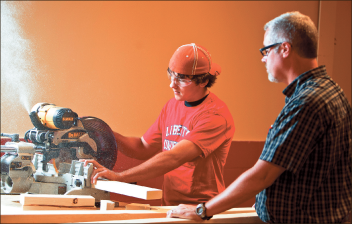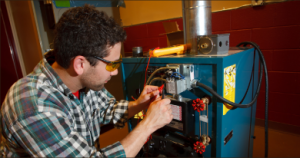When Liberty University student Drew Moore took his Electrical 101 course, little did he know that the class would help his chances of landing a job at Oliver Electric in Delaware this summer.
“I was enrolled in the electrical program with hopes of having some practical experience to fall back on in the future,” Moore said. “After having dipped my feet in the electrical field, I am considering the possibilities of a career in such a field.”
The technical studies program at Liberty has been offering classes for students in welding, plumbing, electricity and other areas since it began in the fall of 2011.
According to Director of Technical Studies Lance McClure, the program resulted from a meeting with Chancellor Jerry Falwell Jr. and the staff at Virginia Technical Institute (VTI) in AltaVista, Va.
“They decided that it would be good for Liberty University students to have a trade or a craft during their college years,” McClure said. “It’s resulted in a lot of students taking these classes either as a minor or taking these classes as an associate degree itself.”
Around 100 students enroll in the technical studies program each semester. Classes are held in the facilities at VTI, and transportation is provided by Liberty to the VTI campus. The associates program offers six different specializations in the areas of carpentry, electrical wiring, HVAC, masonry, plumbing and welding, according to McClure.
“With the associates degree, students will come out highly employable — they will have learned all the required skills (for their profession),” McClure said. “All they would need after leaving us will be the field experience that some jobs require you to have.”
Students from the program have been able to acquire work positions within companies such as Georgia Pacific, Southern Air, Fleetwood and other companies, according to McClure.
Even if a student does not major in technical studies, they can still choose to take these classes as an elective or a minor. Engineering major Rebekah Houser is also taking classes in electronics with the program.
“I would recommend taking one or two classes if you can put it in your degree completion plan,” Houser said. “It’s something that you can do on the side to give you an extra skill set.”
Houser also mentioned that the technical studies classes can be beneficial to business majors and people who are planning to go into missions.
“I think that even when you’re on a missions field, having these skills can be very helpful, especially because sometimes you have to do a lot of (technical work) by yourself.”
Studio art major Sarah Hines has taken welding classes with a different motive.
“My dream is — and has been for a long time — to make a metal sculpture,” Hines said. “Level one welding has taught me the basic knowledge in the trade, and it has also taught me that my dream of making a metal sculpture is realistic. I plan to finish all three semesters of welding as well as completing my B.S. in Studio Art at Liberty.”
But before a student can jump straight into welding or carpentry, he must first take CRFT 101, which is the prerequisite to all technical studies classes.
“We offer (CRFT 101) as an intensive between Jan. 7-11, and it’s important that (interested) people get registered for that soon,” McClure said. “We take you to VTI and we bus you down there — it’s kind of a neat way of taking CRFT 101.”
Students will be able to sign up for CRFT 101 along with other technical studies classes through ASIST, but McClure recommends that they check the availabilities as soon as possible because the classes are limited.


